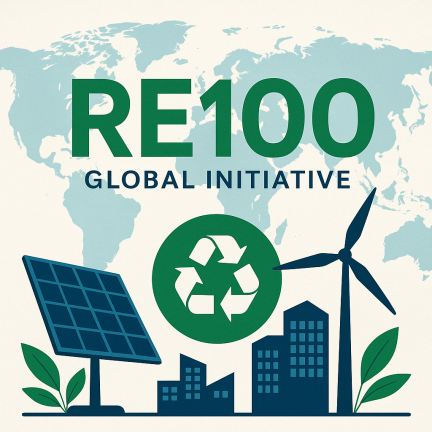You may have seen the term “RE100” more often lately. What began as a sustainability campaign has now evolved into a global business strategy that is shaping how companies address climate change, build brand value, manage supply chains, and gain investor trust. As climate issues grow more urgent, RE100 has emerged as a defining standard for corporate responsibility and long-term competitiveness.
What Is RE100?
RE100 stands for “Renewable Energy 100%”. It’s a global initiative where companies commit to sourcing 100% of their electricity from renewable sources such as solar, wind, and hydro. Launched in 2014 by The Climate Group in partnership with CDP (Carbon Disclosure Project), the initiative has grown rapidly from a handful of European participants to over 400 multinational corporations worldwide as of 2024.
Leading Members of RE100:
- Apple: Already fully powered by renewables and requires the same from its suppliers.
- Google: Uses 100% renewable energy across all operations.
- IKEA: Plans to be fully circular and climate-positive by 2030.
- Samsung Electronics, SK Hynix, LG Energy Solution: Key Korean firms joining the global trend.
Why RE100 Is a Global Issue
1. Climate Change and Net-Zero Goals
Climate change is no longer a distant problem—it’s a present-day crisis. According to the World Meteorological Organization, global temperatures are nearing a 1.5°C increase over pre-industrial levels. This urgency has led to international pressure on governments and businesses to cut emissions. RE100 offers a practical and measurable path toward net-zero emissions, aligning directly with the goals of the Paris Agreement.
2. Supply Chain Pressures
RE100 commitments increasingly affect not just the companies themselves but also their entire supply chains. Apple, for example, requires its suppliers to switch to renewables, or risk losing contracts. This has pushed manufacturers in Korea, Japan, and Taiwan to urgently pursue green energy procurement.
3. Investors and Consumer Expectations
Investors today prioritize ESG performance alongside financial metrics. Major asset managers like BlackRock now factor in sustainability when choosing which companies to support. Meanwhile, consumers are gravitating toward brands that reflect their environmental values. Joining RE100 enhances brand reputation and fosters long-term loyalty.
4. Policy and Regulatory Trends
Countries like the U.S., Japan, and members of the EU are stepping up green regulations. The EU’s Carbon Border Adjustment Mechanism (CBAM), for example, will impose carbon tariffs on imported goods based on their environmental footprint. For companies, joining RE100 can serve as a preemptive strategy against future regulatory risks and financial penalties.
Korea’s Participation and Remaining Challenges
South Korea has a manufacturing-heavy economy and relatively low renewable energy adoption—only about 9% of total power generation as of 2023. However, Korean firms are joining RE100 at a growing rate. Companies like SK Hynix, Samsung Display, POSCO, and Amorepacific have made public commitments, and the government has introduced a local version of the initiative: K-RE100.
Yet, significant challenges remain:
- Lack of Infrastructure: Delays in solar and wind installations due to zoning, regulations, and community resistance.
- High Energy Costs: Renewable energy is still more expensive than conventional sources, especially for small and medium-sized businesses.
- Limited Power Purchase Agreements (PPAs): Companies face legal and structural barriers to directly procuring renewable energy.
- Transparency and Certification: Need for international-level systems to verify and track renewable usage.
Business Benefits of Joining RE100
- Export Competitiveness: Meet the green standards of global clients.
- Brand Enhancement: Boost consumer trust and investor confidence.
- Long-Term Cost Predictability: Secure energy prices via fixed, long-term renewable contracts.
- Risk Mitigation: Stay ahead of climate regulations and avoid future compliance issues.
Conclusion: RE100 Is No Longer Optional
RE100 is not just a “good to have” policy—it is becoming a core element of corporate survival and success. For Korean businesses heavily dependent on exports, participation is a strategic investment, not an optional commitment. In a world increasingly shaped by climate awareness, the companies that act now will be the ones leading tomorrow.
RE100 is not a distant goal. It is today’s competitive advantage.
